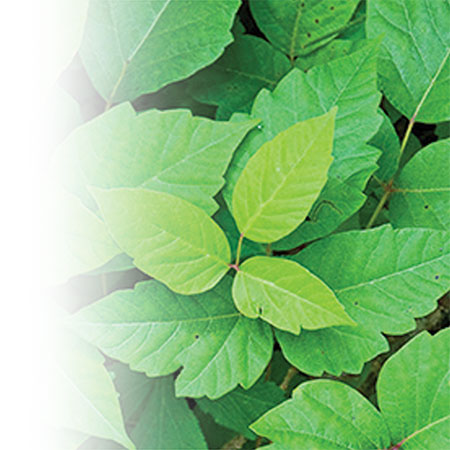Poison ivy is a poisonous plant that can cause a severe inflammatory reaction on the skin. Learn more about it.
What is poison ivy?
Poison ivy is a poisonous plant that is a threat to many people. It is widespread in Canada and usually grows on uncultivated land, especially in ditches, roadsides or in nature trails. It can also be found on or around rural or residential properties.
This weed can be difficult to recognize, as it takes on different appearances. Typically, it is a bushy plant, without thorns, measuring between 20 centimeters to one meter high, depending on the variety. A stem has three green leaves; these can also be a red or brown colour and are always poisonous. Even when the plant is dead, it can cause an intense skin reaction.
What are the harmful effects of poison ivy?
The sap contained in various parts of the plant contains a toxic substance called urushiol, which causes a severe skin reaction manifested by, among other things:
- severe itching
- pain or burning sensation
- swelling and redness
- blisters
The typical reaction caused by urushiol can occur after:
- direct contact with poison ivy (feet and legs are often affected)
- contact with an object soiled with the toxic substance (clothing, animal hair, gardening gloves, and so on)
- exposure to the smoke produced when the plant is burned
It may take a few weeks before the skin reaction disappears completely.
What is the difference between poison ivy and ragweed?
It is common for people to confuse poison ivy with ragweed as the terms are similar in French. Other than their names, these plants are similar in that they are both weeds that can cause health issues. Poison ivy affects the skin, causing a severe inflammatory reaction, while ragweed causes allergic reactions, especially of a respiratory nature, in people who are sensitive to it.
Ragweed pollen causes an allergic reaction commonly called “hay fever” in millions of Canadians during the summer months. Because ragweed is often found along roadsides and vacant lots, outdoor activities or road trips can turn into a nightmare for people with allergies. Unlike poison ivy, ragweed is safe to touch and can be pulled out with bare hands.
For additional information about ragweed and related allergies, read the following text: How to recognize and treat a ragweed allergy.
What should you do if you come into contact with poison ivy?
If you have come into contact with poison ivy or its sap, first remove your clothing and clean the affected areas thoroughly with soap and water.
If you have a skin reaction, it is recommended that you:
- avoid scratching (this will make the itching worse)
- apply a cold source to the affected area (e.g., a washcloth soaked in cold water) or take a warm bath
- speak to a pharmacist before applying any product to the affected area, as some agents may worsen symptoms
- use a product to soothe itching (e.g., calamine lotion, antihistamine tablets), if recommended by a pharmacist
In the event of a severe reaction, it may be advisable to see a doctor, who may prescribe medication, depending on the nature and intensity of your symptoms.
How can a reaction to poison ivy be avoided?
To avoid the unpleasantness of a reaction to poison ivy, it is best to learn to recognize the plant and avoid contact with it. You can also take certain precautions:
- Wear boots or closed-toe shoes and pants if you are walking in an area where poison ivy can grow.
- Wear long clothing and waterproof gloves when you garden.
- Wash any clothing or items that have come into contact with the plant or its sap.
- Avoid burning the plant and its parts.
See a healthcare professional who can diagnose the problem and explain what to do if you think you may have come into contact with poison ivy. Your pharmacist can provide you with information on how to recognize the plant, how to get rid of it, and how to treat the skin reaction it causes. Don’t hesitate to ask.


